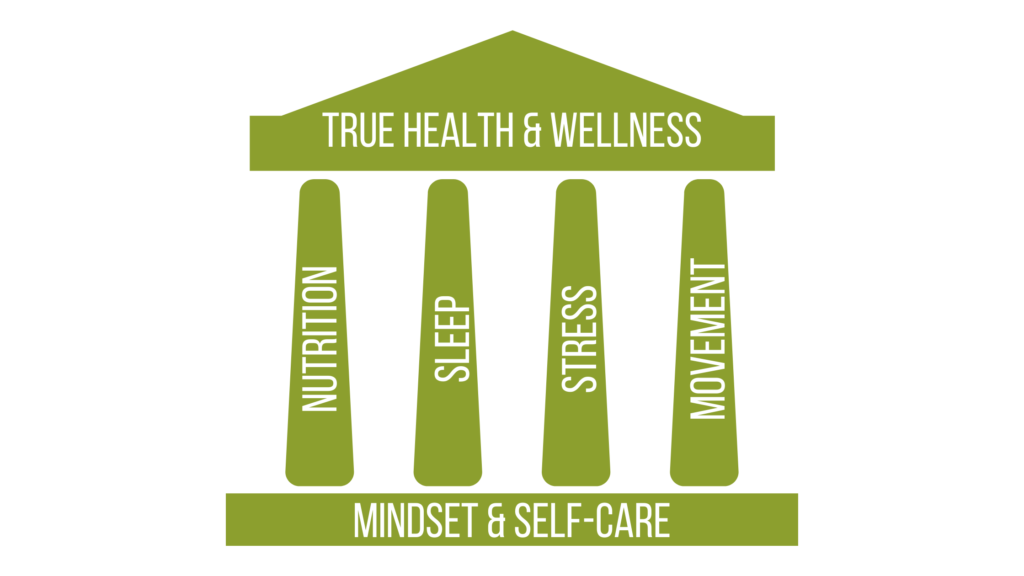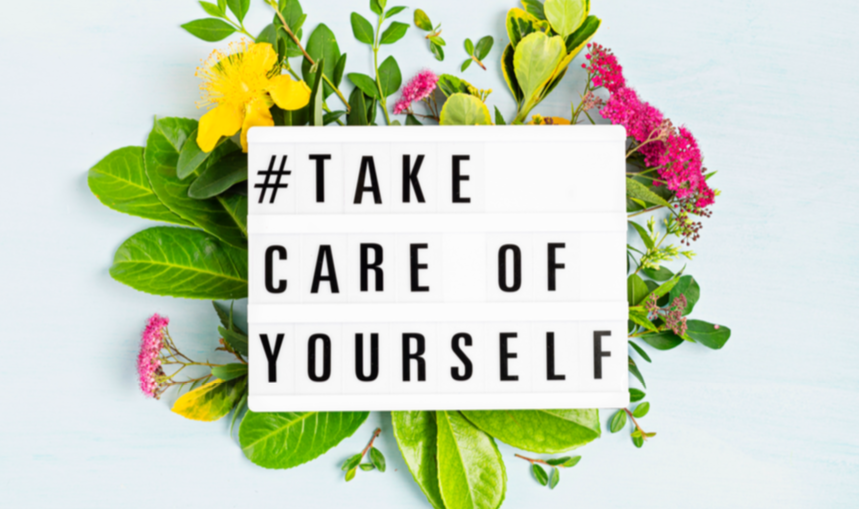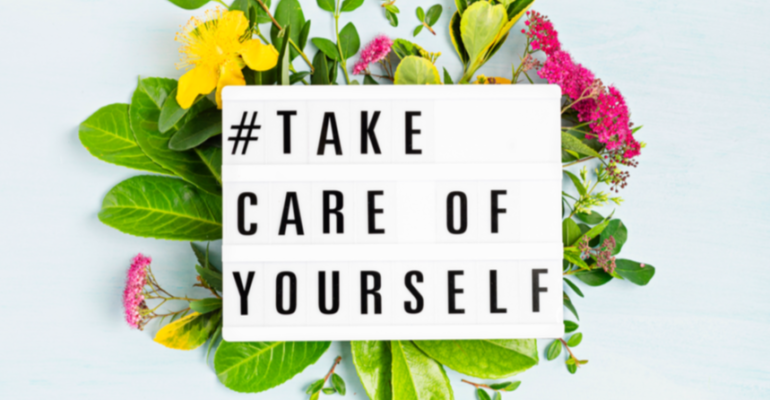Our Four-Pillar Approach to Health & Wellness
January 7, 2022 2024-01-03 13:51Our Four-Pillar Approach to Health & Wellness
Each and every day a new diet, lifestyle, or supplement recommendation comes out and we often fall prey to wanting that “quick fix” in our lives. Most health coaches focus on one area of expertise (nutrition, fitness, etc.) or get sucked into this mentality of offering what is purported to be “the easy way out” of your health concerns. However, we educate health coaches and natural nutrition experts to take a different approach with their clients by following a whole-body & mind approach to helping clients succeed in their wellness journies and goals. This means that in our Natural Nutrition Coach program & others, we educate on using a holistic, whole-body approach to wellness because in reality – there are no quick fixes! All the body systems and functions work synergistically to be in balance. If we focus solely on nutrition we may succeed to some extent, but then stress, for example, could still be driving hormonal imbalances that cannot be solved solely with nutrition alone. You must fix the stress component as well. This can be said for many common and often chronic health issues such as diabetes, migraines, cardiovascular disease, autoimmune disease, and many others! You have to take a full-circle approach looking at all sides of the health equation – which is where the four pillars to health come in.
What are the “Four Pillars” to True Health & Wellness?

There are four key components to true health and wellness: whole-food nutrition (think about foods that don’t come with a label!), stress management, quality sleep, and movement. A lot of people will have heard of these topics before, especially from Health Coaches, Fitness and Nutrition Practitioners. However, what is often not spoken about is the foundational principle to this health “structure”. Imagine that you are building a house. If you try to place four pillars in the ground standing up, without a foundation, what will happen? They will fall over because the foundation isn’t there – there is nothing solid holding these pillars in place. The Health Coach Collaborative courses teach not only the pillars of health but also what is foundationally necessary to succeed in having a strong “house” and thus success in your health goals. Mindset and self-care need to be the first step in our approach to health coaching as it is the foundation of our four pillars approach to true health & wellness.
Dial in on Your Mindset & Self-Care

When was the last time you paid attention to what your body needed & truly listened to it? Mindset & self-care could be seen as synonymous but on a basic level, self-care means that you focus deliberately on the things that benefit your physical, mental, and emotional well-being. It is typical that most people skip self-care or have not defined the reason WHY they want to make a change before embarking on their wellness journey. If you are not conscious of the why, it may feel more difficult to stay on track and likely not result in true, long-term change. Your choice for change needs to be rooted in the fact that you are taking care of yourself.
What is Self-Care?
Self-care can be as simple as not looking at your phone before bed because it disturbs your sleep, booking a massage, taking a vacation, or allowing yourself to have a proper break at lunch. Many of us forget that having time to reconnect with who we are and what we want in life will allow us to have a healthier relationship with ourselves and feel more energetic in all aspects of our life. Self-care is not a selfish act, it is the ability to look at how you move within our world and how that may affect yourself & others. If we are not at our best, how can we possibly be able to help others and even ourselves to our fullest abilities? By giving yourself space to have a break, you are rediscovering and reintegrating the parts of yourself that you want to share with those around you. The renewed energy that you have will benefit those around you even more.
What is Mindfulness?
Mindfulness practices allow us to: wake up, pay attention, and become present so we can get the most out of each day. It teaches us how to respond to situations more calmly and recognize our unhealthy habits. It can also help us become more tolerant, less judgmental, and kinder to others and ourselves. When many are faced with staying at home for days on end, mindfulness tools help us feel anchored in what can feel like a swirling sea of chaos and help us find the calm that is so needed so right now.
Mindfulness, when practiced and cultivated, puts YOU back in control of your life. It has us seeing solutions or road signs that place us on the path of joy and being happy when we might otherwise feel like we’re losing our minds.
I am a recovering perfectionist & an aspiring “good-enoughist”.
Bréne Brown
Stress

Modern life is fraught with stress. The regular pressures of life—finances, family responsibilities, health problems, and work demands, to name a few—are overwhelming for many. The very devices created to make life easier, such as technology, mobile phones, and the internet, have actually resulted in a faster pace, more demands, minimal downtime, and overstimulated minds. Generally, humans today are overloaded with stress. This takes a toll on health, and that toll can have life-long consequences. It is now recognized that the greatest causes of death and disease on the planet are preventable lifestyle-related chronic diseases, of which stress can play a contributing role.
How to Shift Your Stress
It is common for people to take on too much. Think about your current situation or others around you and the situations they may be in – work, family, social obligations, kids, going to the gym, excessive exercise, etc. Generally, most people have a long work week, then pile other expectations on top of that. It is no wonder people want to “escape” on the weekends or in the evenings using less than healthy methods such as excessive alcohol consumption, saying yes to something when you really want to say no, or not allowing rest when it is very much needed. The key to reducing stress is to be mindful of how you are currently treating yourself, hence the foundational component in the four pillars. Are you pushing yourself to the limits? Do you spend the weekends engaging in less-than-healthy behaviors? Maybe you are going to the gym to release stress instead of resting? Believe it or not, if this sounds like you, you may be contributing to increased stress.
Whole-Food Nutrition

Considering that our Natural Nutrition Coach program is about nutrition, we could go on for hours on this topic! This blog post can’t go into the depths of nutritional science that we think is important or everyone to know (check out our Health Coach Certification for this!) but we do hope you have the realization that food plays a vital role in our body and how well it functions from a health standpoint.
Now logically speaking, it is impossible to imagine that nutrition doesn’t affect our health. It is why we are seeing an increase in chronic illnesses, including diabetes, cardiovascular disease, obesity, hormonal issues, and other chronic illnesses. B.W. Richardson said, “Preserve and treat food as if it were your body, remembering that in time it will become your body” and this couldn’t be more true!
Our bodies are a complex system of metabolic pathways, energy, and chemical reactions, and all of these are driven by what we put into our bodies. Our food intake is directly correlated with the building blocks of our cells, muscles, organs, and plays a vital role in our vitality. The way that food is being created and grown is changing our connection with our food and its impact on our health. It is important to realize how vastly far away we are from our natural, whole-food diets – of which we are biologically & evolutionarily meant to function optimally with!
Nutrition Basics
Create Healthy Meals at Home
The biggest obstacle to healthy eating is a lack of time. A hectic lifestyle leaves little time for grocery shopping, food preparation, or cooking. The end result is that healthy eating takes a back seat to convenience food. Picking dinner up on the way home is easier than cooking a meal after a long workday, but this habit can take a toll on your overall health. A lot of us don’t realize how much time we actually save if we prep healthy meals ahead of time and can rely on the balanced nutrition and energy they will provide when we do this.
Eat Your Vegetables
There is an abundance of vegetables to choose from, and each one has its virtues. If you don’t like most vegetables, list those you do like and eat them often. Enjoy vegetables raw, cooked, steamed, sautéed, baked, or fermented. Raw vegetables retain the most nutrients (frozen is your second-best choice, and canned (with a BPA free lining) as a last resort).
Eat Mindfully
Slowing down can mean speeding up your metabolism. Heading to the kitchen pantry or our for a quick & fast meal, hoping for a little relief, ends up sitting as an extra pound or two around our hips. But it doesn’t have to if we practice mindful eating. When we eat mindfully, we not only gain more pleasure, energy, and nourishment from our food. We also fire up our metabolism in a way that encourages weight loss if that’s something your body needs.
Sleep

For most adults, at least seven hours of sleep each night is needed for proper cognitive and behavioral functions. An insufficient amount of sleep can lead to serious repercussions. Some studies have shown sleep deprivation leaves people vulnerable to attention lapses, reduced cognition, delayed reactions, and mood shifts.
It’s also been suggested that people can develop a sort of tolerance to chronic sleep deprivation. Even though their brains and bodies struggle due to lack of sleep, they may not be aware of their own deficiencies because less sleep feels normal to them. Additionally, lack of sleep has been linked to a higher risk for certain diseases and medical conditions. These include obesity, type 2 diabetes, high blood pressure, heart disease, stroke, poor mental health, and early death.
Adults who do not receive a sufficient amount of sleep each night can implement some positive lifestyle and sleep habits in order to log the needed seven to nine hours. These include the following:
Change How you Think about Your Room
Often because we are so fatigued we spend a lot of time in our beds, watching Netflix, scrolling the internet, looking for other people who are going through what we are. However, our rooms should be somewhere of comfort. We should be using our bedroom for two things: sleep and romantic endeavors. We need to ensure that we find our rooms comfortable – this means letting go of old habits that may be making it hard to get comfortable in our bedroom.
Get Rid of the Electronics
Watching TV or hanging out on your phone has multiple effects on the body. Engaging in programs keeps the mind active and busy. But these screens also emit blue light which affects the body’s ability to produce melatonin (sleep hormone) effectively. Light is associated with wakefulness. When there is light, your body doesn’t know to fall asleep.
This goes for all devices – cellphones, tablets, laptops, e-readers as well as your alarm clock. Now if you use your cell phone as your alarm, like many of us, make sure to plug it in out of reach. Switch your phone to airplane mode about 1.5 hours before bed and put it across the room. Most people are too tired at that point to get back up again to check it or be distracted by it. Find a positive habit to replace with your electronics such as reading, meditation, breathwork, or something else that brings positivity and stillness to your life!
Movement

Movement is an essential pillar of overall good health. Humans are built to move. Our bodies evolved to walk, jump, run, swim, bend, squat, and so on. Most of us aren’t using our bodies to their full potential; in fact, we’ve made sitting an art form! We sit to eat, we sit at our desks, we sit in our cars, and we sit when we relax while binging on Netflix. Sit, Stay, Repeat.
Sedentary behavior and excessive sitting have been associated with many conditions such as back pain, neck pain, decreased flexibility and mobility issues, and diseases such as hypertension, cancer, diabetes, cardiovascular disease, depression, and obesity. Our lack of movement is recent in our human history. Only 150 years ago, our ancestors spent more hours on their feet and sat just an average of 3 to 5 hours, mostly on breaks in between working. In contrast, in our modern Western culture, we sit an average of 13 to 15 hours per day! In countries like Canada and Australia, excessive sitting is the new smoking, in other words, excessive sitting is a national health concern. Not just for adults but also for children as obesity rates and other health concerns associated with a sedentary lifestyle are on the rise. Thus, we’ve established movement is an important pillar of a healthy lifestyle.
Tips for Increasing Movement at Home
- Limit screen time, including computer, tv, and phone scrolling.
- Multitask, when you do watch tv, during the commercials take time to fit in some movement, walk around the room, do wall push-ups, or chair squats, fold laundry, or do some stretching.
- Home chores such as lawn mowing, shovelling snow, raking leaves, gardening, all count!
- Exercising doesn’t mean you have to go to a gym! Find an activity or activities that you like to do. Ride a bike, walk, or hike with a group, take up dancing, swimming, yoga, or curling; there are so many choices!
- Work extra movement into your everyday routines, for example, walking instead of taking the car when possible. Or walk around when brushing your teeth!
When it comes to movement, set an easy goal, make a plan to achieve it, and then add in an extra movement when possible because “every step counts”!


